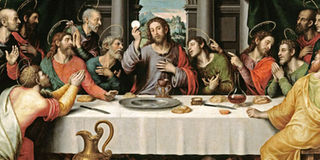Why many believers miss out on the Lord’s Supper

An illustration of The Lord’s last supper.
What you need to know:
Eucharist
When we take the Lord’s Supper (Communion), it is important to remember Jesus’ sacrifice for us. It isn’t something we should just do without thinking about what it truly represents. It was given to us by Jesus Himself, so we wouldn’t forget His great love for all of us. Next time you take Communion, remember what it stands for and how wonderful a thing Jesus did for us.
The Lord’s Supper, also known as, Eucharist is an ordinance meant to be observed over and over again throughout the life of a Christian. It is a holy time of worship when Christians come together as a body to remember and celebrate the sacrifice of Christ’s body and the shedding of His blood on our behalf as He instituted and commanded us to do. One of the biggest challenges for Christians during the coronavirus pandemic is the inability to celebrate the Lord’s Supper since churches are closed.
According to Edison Muhindo Kalengyo, in his book Celebrating the Lord’s Supper, this challenge is not necessarily a new one for the larger majority of Christians living in rural areas.
“The majority of congregations can go for many weeks, months and even a year without ever participating in the Lord’s Supper. This is shocking not because the Lord’s Supper is a church ritual but because failure to observe it represents blatant disobedience to Jesus Christ’s explicit command.
At the institution of the Lord’s Supper, he told his disciples: “Do this in remembrance of me” (Luke 22:19). We celebrate the Lord’s Supper to bear witness to the Lord’s death and resurrection as the apostle Paul instructed in Corinthians.
“For I received from the Lord what I also passed on to you: The Lord Jesus, on the night he was betrayed, took bread, and when he had given thanks, he broke it and said: “This is my body, which is for you; do this in remembrance of me.”
In the same way, after supper, he took the cup, saying: “This cup is the new covenant in my blood; do this, whenever you drink it, in remembrance of me.” For whenever you eat this bread and drink this cup, you proclaim the Lord’s death until he comes.”
Changing demography
Inasmuch as the Lord’s Supper is intended to be celebrated as often as the body of Christ gets together, Kalengyo notes that a number of circumstances make this impossible. “The demographic landscape of Christianity is changing. The number of Christians is growing so rapidly that it has outpaced the supply of well-trained African ministers, pastors and theologians. While the church is growing, there has been a dramatic decrease in the number of students enrolling for courses in theology and ministerial training,” he says. He suggests that just as Jesus taught that the Sabbath was made for the people, not the other way round, so the Lord’s Supper was made for people. In recognition of the scarcity of ordained priests to officiate at the Lord’s Supper ,it would make a difference for lay leaders to be given authority to lead the congregation in the celebration of this ordinance.
State of marriage
Another reason people are failing to celebrate the Eucharist is their perceived unworthiness because of the state of their marriages.
“The absolute exclusion of those customarily married from the Lord’s Supper is a cause of malnourishment to many who may not even be aware of what they lack. This type of famine among God’s people can no longer be defended or justified,” he says. This fear of partaking unworthily in the Supper can be solved by recognition of traditional marriages by the church, Kalengyo suggests. As Jesus preaches, the church is not exclusive to only the righteous.
The Lord’s Supper is the place where the forgiveness of sin is proclaimed and offered to all who would receive it. What is important for Christians is that they have examined and repented before partaking the holy meal as Paul urges. He instructs Christians to test their motives and attitudes and be certain they are partaking for the right reasons and with the right understanding of what the elements represent. Otherwise, it will just be a mockery of that which should be the most sacred meal.
Import
Before Jesus died on the cross, He had a final meal with His friends, the Disciples. He wanted to give them something to remember Him by when He wasn’t with them, so He used the bread and the wine that they were having with their supper that night. The bread and the wine are both symbols that represent Jesus.
The broken piece of bread reminds us of His body, which was broken when He was nailed to the cross. The wine reminds us of Jesus’ blood that He shed for us on the cross. Jesus loved us so much that He gave His body and blood for us, so we could be forgiven when we sin. That is a lot of love for each and every one of us.
When we take the Lord’s Supper (Communion), it is important to remember Jesus’ sacrifice for us. It is not something we should just do without thinking about what it truly represents. It was given to us by Jesus Himself, so we would not forget His great love for all of us. Next time you take Communion, remember what it stands for and how wonderful a thing Jesus did for us.




